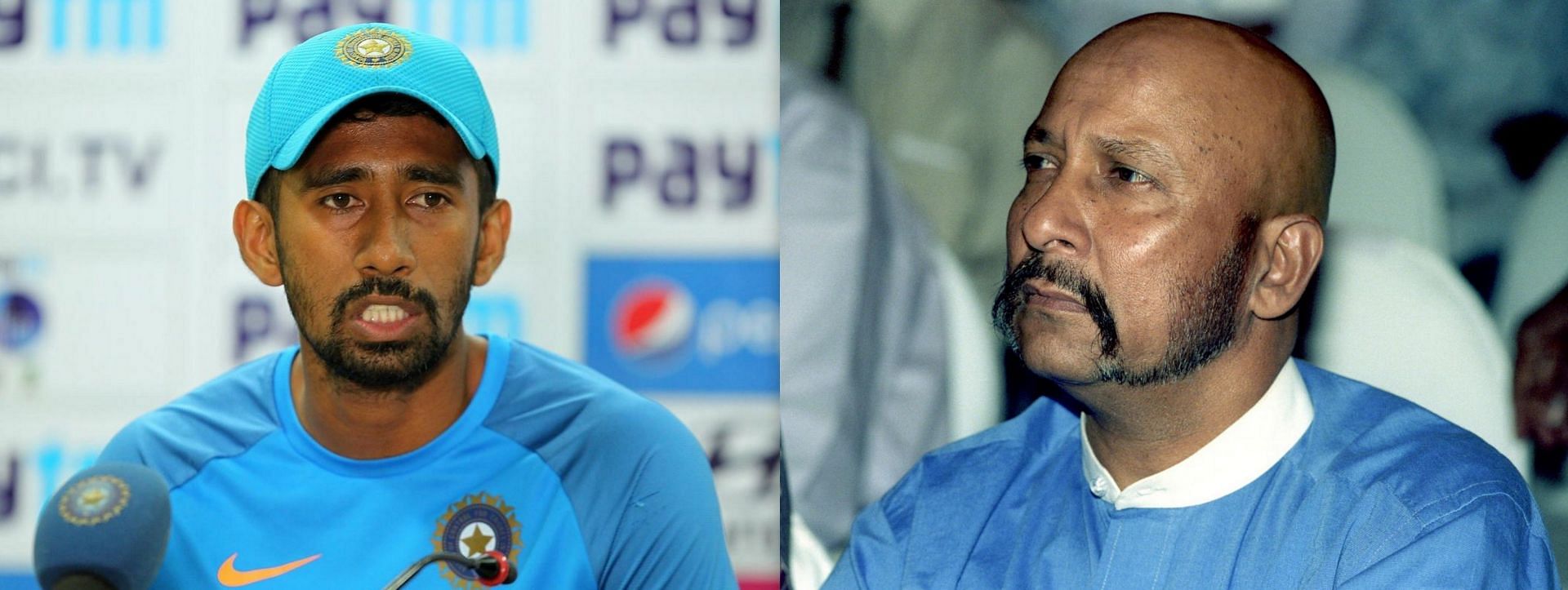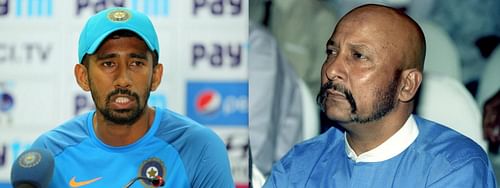
“Like me, Wriddhiman Saha has been dropped from the Indian team at his peak” – Syed Kirmani reveals the injustice he suffered in his own playing career

Bengal wicketkeeper-batter Wriddhiman Saha’s omission from India’s Test squad for the upcoming two-match home series against Sri Lanka has caused a great furore in the country’s cricket community.
The news came as such a big shock to legendary Indian gloveman Syed Kirmani that it revived some unpleasant memories of his own playing career. An integral part of India’s first World Cup-winning team in 1983, Kirmani’s exploits behind the stumps won him the "Best Wicket-keeper" award at the marquee event in England.
His batting, noted for its sheer tenacity yet seriously underrated, bailed India out of deep waters on many occasions. In a must-win game against Zimbabwe at Tunbridge Wells during the 1983 World Cup, his unbroken 126-run partnership with Kapil Dev for the ninth wicket enabled the latter to score an iconic 175* and paved the way for India’s title triumph.
This, and many such acts with the bat, earned Kirmani the sobriquet of the “crisis man” of Indian cricket.
However, within a couple of years since reaching the zenith of world cricket, Kirmani was dropped from the Indian team on the pretext of an injury. He went back to domestic cricket and proved his fitness, but the door to the national team remained shut for him.
Kirmani finds a striking similarity between the incident and Saha’s snub, implying how unfairly the 37-year-old has been shown the “exit door” despite being fit and scoring a match-saving 61* with a back pain against New Zealand in his last Test innings in Kanpur in November 2021.
Speaking exclusively to Sportskeeda on Tuesday, the former wicketkeeper and Padma Shri recipient reacted to Saha’s Test ax and recounted the 'injustice' meted out to him in his own playing career.
Here are the excerpts:
Q: What is your reaction to this whole controversy surrounding Wriddhiman Saha’s omission from the Test squad?
Kirmani: Saha has got tremendous competition around him with all the youngsters performing well in the IPL and other limited-overs matches. He’s obviously very sad, but every cricketer has to go through the ups and downs, right? We don’t know what the selection committee and the team management think about the player. I have also been a victim of injustice, but nobody talks about it.
Q: Could you kindly elaborate on that? Why were you dropped from the Indian team in 1986?
Kirmani: I don’t know. I was at the pinnacle of my career around that time. Yet, I was dropped from both the Test and ODI teams for no fault of mine. There was no competition around me. I played 88 Tests and was the savior of India’s ODI team on many occasions.
Do you know, wrong reports were published in the newspapers suggesting that I was performing poorly? While somebody else would drop a catch in the slip cordon, they [the media] would publish my photograph and insinuate that Kirmani had dropped a catch or missed a stumping!
Q: What happened next?
Kirmani: [In an assertive tone] In 1986, I suffered a minor injury, but a big issue was made out of it. In fact, the then manager of the Indian team claimed, "An injured Kirmani has to return home" before dropping me. I still have a cutout of that article. Why would you do that when I was performing so well? Actually, I caught a leg-side flick of Allan Border and went rolling down [in a World Series Cup match during India’s tour of Australia in 1985-86]. I got up and just shook my ankles to check if everything was alright. They took a cue from it and dropped me under the false pretext of an injury [laughs]!
Q: Was it communicated to you before, or did you learn about it from the media?
Kirmani: Nothing! There was no communication from anyone! I became very popular by 1986, which some people couldn’t accept. Whether in Adelaide, Sydney, Brisbane or Melbourne, as soon as we landed, the media took me aside, leaving the superstars of the team behind. I also acted in a Bollywood film [Kabhi Ajnabi The] alongside Sandeep Patil because of which I was highlighted in the newspapers!
Q: How did you deal with the phase after being dropped from the Indian team?
Kirmani: I’ve always been a fighter. My own state [Karnataka] removed me from the team when I wanted to stage a comeback and honor my country. That’s why I was forced to move to the Railways team. The then secretary of the Karnataka State Cricket Association [KSCA] said, ‘Oh, so you’re going to the Railways? Let’s see how you perform there.’ Is that how you talk to a World Cup winner and someone who has always been a team man?
Q: Coming back to Wriddhiman Saha, did you feel that he wasn’t able to deliver his best or he wasn’t fit enough? Even in his last Test innings, he scored a match-saving 61* against New Zealand in Kanpur…
Kirmani: I rate this boy very highly. In my opinion, he is currently India’s most technically sound wicketkeeper. But the selection committee, the team management and others have something else on their minds. Unfortunately, he has very stiff competition.
Q: Do you think age should really be a factor behind dropping a player, even if he performs well?
Kirmani: This age factor has been there for a long time now. I was also a victim of this. They didn’t spare even Sachin Tendulkar, right? I believe that a player matures from the time he’s thirty-years old; until then he’s in a learning process. Just like me, Saha has been dropped from the Indian team when he’s at the peak of his career. And why are we only talking about cricketers? What about the administrators?
Q: In the press conference after India’s final T20I against the West Indies in Kolkata, India's head coach Rahul Dravid said that he informed Saha of his exclusion beforehand because he respects him. Furthermore, Saha revealed that BCCI president Sourav Ganguly had assured him of a place in the side via a text message some days ago. Are you satisfied with their roles in the entire issue? Do you think they could’ve handled the situation better?
Kirmani: Well, I exactly don’t know how and what they’ve conveyed to him, so I won’t be able to comment on it. Irrespective of whatever has happened, Saha should take the matter sportingly and fight it out in the Ranji Trophy to force a comeback. I’ll tell you again about my own career. From 1986 to 1993 I did so well in first-class cricket that no other wicket-keeper in the country could match my performance. Still, the conspirators wanted to remove me from the team one way or another.
Q: So you’re advising Saha to play the Ranji Trophy…
Kirmani: Yes, obviously! I think he should continue playing as long as he can. I haven’t announced my retirement officially. I had to write a letter to the BCCI to get my benefit as a lot of benefit matches were played back in those days.
Q: In the Australian team we have the example of Brad Haddin, who was brought into the coaching staff shortly after announcing his international retirement in 2015. Do you think the BCCI should consider Saha for a similar role going forward?
Kirmani: Okay, since you’ve brought up this topic… I live in Bangalore, the NCA [National Cricket Academy] is in Bangalore, so why haven’t you considered me for this role before? The wicketkeeper has a pivotal role as he guides the captain, the bowlers and the fielders. He finds the weaknesses of the batters playing in front of him. That’s why I was delighted when MS Dhoni was made the captain of India.
If you can have a batting coach, a bowling coach or a fielding coach in a team, why can’t you have a wicketkeeping coach? When a wicketkeeping coach comes in, you don’t need a bowling coach or a fielding coach because he’s the best guide to the bowlers and the fielders.
Q: There are some people who’re claiming that there’s a propensity to promote talent mainly from South India at present. Is regional bias a myth or a reality in Indian cricket?
Kirmani: Yes, it’s a reality. It has been happening since Baba Adam’s time, man [laughs]! It’s very evident. You don’t have to quote me for that. We all know what’s happening, right? Saha is a brave cricketer. He should keep playing as long as he enjoys the game like I did. Retirement is in his own hands. Nobody can force him [to retire]. I believe that Dravid, Ganguly, [Anil] Kumble and Dhoni could’ve played for a few more years, but they’ve achieved enough. At the time, the media said that they should retire and make way for youngsters, right?
Q: Despite enjoying such a stellar international career, you seem to be unhappy…
Kirmani: I was promised by the board presidents of my era that I would get a role when Kapil [Dev] was made the chairman of the NCA [in 2006]. Then came Sunil Gavaskar followed by Ravi Shastri and Dav Whatmore, but why didn’t the board consider me for that role? A lot of injustice was meted out to me by my own state. I’ve never been given an opportunity to mentor players from my own state.